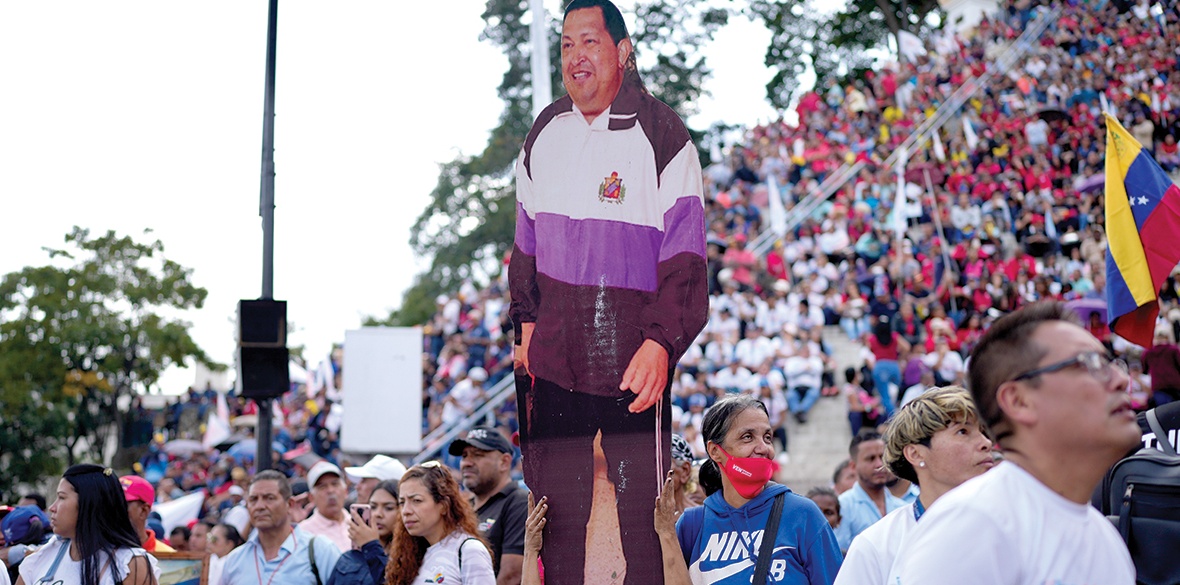This is the last article you can read this month
You can read more article this month
You can read more articles this month
Sorry your limit is up for this month
Reset on:
Please help support the Morning Star by subscribing here
TWENTY-FIVE years ago later this year Hugo Chavez won the presidential election in Venezuela and paved the way to a sustained period — marked sometimes by setbacks of course, as any struggle is — of electoral victories by leftist forces in South America against powerful local elites buttressed by the United States.
As the annual Latin America conference meets today to discuss how progressive mass movements across the region are again resisting neoliberalism and US domination in their struggles for independence and sovereignty, Venezuela’s achievements in the Chavez period in this respect stand out as an example.
The US tried unsuccessfully to oust Chavez from office continually, including through the temporarily successful coup in 2002, but just months before he died, he again defeated the US-backed candidate in yet another election victory.
Then, after Chavez’s death, the US empire intensified its drive for regime change, especially from 2015 onwards. Wrecking Venezuela’s economy through economic strangulation was the chosen strategy.
The subsequent onslaught of US economic sanctions against Venezuela led to a 99 per cent fall in its oil revenues and an accumulated negative growth rate of –123.4 per cent between 2014 and 2021.
Despite this, some social advances have continued, for example, by building over three million houses between 2015 and 2022. The economy has also recently made something of a recovery, with inflation down from 1.5 million per cent to single digits.
Economic growth for 2022 is estimated by international institutions to be between 5 per cent and 20 per cent. Exports are up, thousands of new small, medium-sized private, co-operative and communal enterprises are being established and manufacturing is growing.
But the US’s coercive sanctions, which are now akin to the blockade of Cuba, are still having a severe impact on Venezuela and on its poorest and most vulnerable people.
In September 2022 United Nations Special Rapporteur Alena Douhan warned that “the sanctions and unilateral coercive measures applied by the United States and the European Union … flagrantly violate international law and all universal and regional human rights instruments.”
Some relief from the draconian squeeze of sanctions had been at hand in November 2022 from an agreement signed in talks between the Maduro government and US-backed right-wing opposition to free up $3 billion of Venezuelan funds seized by the US government.
The cash, to be distributed by the UN, was to be spent on medical equipment, vaccines, medicines and other supplies, as well as other essential needs.
But the lack of progress on the release of the funds has led national assembly president Jorge Rodriguez to recently accuse the opposition of bad faith, warning that the dialogue talks could cease as a result.
Despite this setback, the talks initiated by President Nicolas Maduro between the government and sections of the right-wing opposition have made some progress.
The talks led first to the more moderate opposition parties breaking with the self-proclaimed “interim president” Juan Guaido to re-engage in electoral activity by participating in the December 2020 parliamentary elections.
The extreme right opposition parties followed, to stand candidates in the regional and local elections in November 2021.
This peeling away from Guaido reached a conclusion on December 30 2022 when the three largest opposition parties decided to abolish Guaido’s “interim presidency,” dissolve his “government” and appoint an executive commission to manage Venezuela’s seized foreign assets.
The move represents a failure of the US strategy to achieve regime change through bankrolling Guaido, who led a number of dismally unsuccessful efforts to oust the Maduro government by force, including a military coup and a paramilitary invasion.
At the same time, the global energy crisis has forced US President Joe Biden to reportedly approach the Maduro government with a view to buying oil to shore up the US domestic market.
So far progress in relieving sanctions on Venezuela has been minimal. But the longer the US faces shortages, the more favourable Venezuela’s position of arguing for sanctions to be lifted becomes.
But meanwhile, Venezuela’s seized overseas assets remain vulnerable. In the US for example, Citgo, the US-based subsidiary of Venezuelan state oil company PDVSA, worth an estimated US $8bn, is in danger of its shares being claimed by several corporations and bondholders as compensation for arbitration awards and defaulted debt.
And in Britain the Venezuelan government is still appealing against a High Court ruling that its claim to control of the 31 tons of gold bars worth roughly $2bn that it deposited at the Bank of England is invalid.
To date, the British government’s pro-Guaido statements have been gratefully used his lawyers in the case. Playing again the role of lapdog to US interests, the Foreign Office recently formally recognised the December 30 decision by the Venezuelan right-wing opposition.
This could enable the court to recognise the opposition’s new “executive commission” as the legal owner of the gold. This threadbare argument must be challenged.
Venezuela’s economic recovery and the support of its regional and international allies may indicate the country has come through the worst. But the US’s hostility and economic aggression against Venezuela remain deep-seated.
Campaigning against US sanctions and Britain’s continuing support for this drive to undermine Venezuela’s national sovereignty remains a key priority for all parts of the solidarity movement here.
Twenty-five years on from Hugo Chavez’s election, standing against the blockade of Venezuela is a vital part of showing solidarity with Latin America as an inspiring new “red wave” takes place again today.
Follow Ken at www.twitter.com/ken4london and www.facebook.com/kenlihingstoneofficial.
Join the Venezuela Solidarity Campaign at www.venezuelasolidarity.co.uk/join.
Event — The Revolution Will Not Be Televised, film showing as part of VSC’s Chavez25 season of events. Tuesday February 21, 7pm, Marx Library, London EC1R 0DU. Free tickets at bit.ly/chavez25film.











